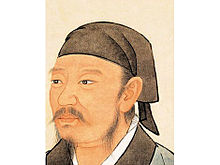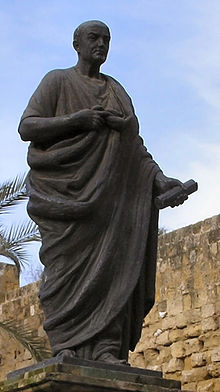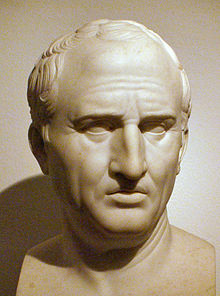Studying
examining written materials for the purpose of learning
(Redirected from Studious)
Studying is the action of attempting to acquire knowledge, either by directly observing phenomena of interest, or by reading the writings of others about these phenomena.







Quotes
edit- Studies serve for delight, for ornament, and for ability. Their chief use for delight, is in privateness and retiring; for ornament, is in discourse; and for ability, is in the judgment and disposition of business. For expert men can execute, and perhaps judge of particulars, one by one; but the general counsels, and the plots and marshalling of affairs, come best from those that are learned. To spend too much time in studies, is sloth; to use them too much for ornament, is affectation; to make judgment wholly by their rules, is the humour of a scholar. They perfect nature, and are perfected by experience. For natural abilities are like natural plants, that need proyning by study; and studies themselves do give forth directions too much at large, except they be bounded in by experience. Crafty men contemn studies; simple men admire them; and wise men use them. For they teach not their own use; but that is a wisdom without [outside of] them, and above them, won by observation.
Read not to contradict and confute, nor to believe and take for granted, nor to find talk and discourse, but to weigh and consider. Some books are to be tasted, others to be swallowed, and some few to be chewed digested. That is, some books are to be read only parts; others to be read, but not curiously; and some few to be read wholly, and with diligence and attention. Some books also may be read by deputy, and extracts made of them by others; but that would be only in less important arguments, and the meaner sort of books: else distilled books are, like common distilled waters, flashy things. Reading maketh a full man; conference a ready man; and writing an exact man. And, therefore, if a man write little, he had need have a great memory; if he confer little, he had need have a present wit; and if he read little, he had need have much cunning, to seem to know that he doth not.- Francis Bacon, I. Of studie, Essaies (Jan, 1597) as quoted by E. A. Abbott, Bacon's essays (1876) Vol. 2 Essay L, Of Studies, p. 72. With Abbott's Notes related to study, pp. 247-248.
- When night hath set her silver lamp on high,
Then is the time for study.- Philip James Bailey, Festus (1813), scene A Village Feast.
- The seers of old had fully restrained selves, and were austere. Having abandoned the five strands of sensual pleasures, they practiced their own welfare. The brahmans had no cattle, no gold, no wealth. They had study as their wealth and grain. They guarded the holy life as their treasure.
- Gautama Buddha, Sutta Nipata, The Group of Discourses, K. R. Norman, trans. (Oxford: 2001), pp. 284-285
- Exhausting thought,
And hiving wisdom with each studious year.- Lord Byron, Childe Harold's Pilgrimage, Canto III (1816), Stanza 107.
- It is essential to every inquiry about duty that we keep before our eyes how far superior man is by nature to cattle and other beasts: they have no thought except for sensual pleasure and this they are impelled by every instinct to seek; but man's mind is nurtured by study and meditation.
- Cicero, On Duties, 1.105
- Me therefore studious of laborious ease.
- William Cowper, The Task (1785), Book III. The Garden.
- Beautiful objects are wrought by study through effort, but ugly things are reaped automatically without toil.
- Democritus (ca. 4th century BCE). Tr. Kathleen Freeman, Ancilla to the Pre-Socratic Philosophers: A Complete Translation of the Fragments in Diels, Fragmente der Vorsokratiker (1948)
- A constant element of enjoyment must be mingled with our studies, so that we think of learning as a game rather than a form of drudgery, for no activity can be continued for long if it does not to some extent afford pleasure to the participant.
- Desiderius Erasmus, Letter to Christian Northoff (1497), as translated in Collected Works of Erasmus (1974), p. 114
- A subject interests me and holds my attention only so long as it presents me with difficulties, only so long as I am at odds with it and have, as it were, to struggle with it; but once I have mastered it I hurry on to something else, to a new subject; for my interest is not confined to any particular field or subject; it extends to everything human. This does not mean that I am an intellectual miser or egoist, who amasses knowledge for himself alone; by no means! What I do and think for myself, I must also think and do for others. But I feel the need of instructing others in a subject only so long as, while instructing others, I am also instructing myself.
- Ludwig Feuerbach, Lectures on the Essence of Religion, R. Manheim, trans. (1967), Lecture 1, p. 2
- Studious of elegance and ease.
- John Gay, Fables (1727), Part II. No. 8.
- For he was studious—of his ease.
- John Gay, Poems on Several Occasions (Ed. 1752).
- In his examination he was not so much interested in Joseph’s Latin or his fingering (in these matters he relied on the teachers’ reports, which he nevertheless spent an hour going over) as whether the boy had it in him by nature to become a musician in the higher sense of the word, whether he had the capacity for enthusiasm, subordination, reverence, worshipful service.
- Herman Hesse, The Glass Bead Game, R. Winton, trans. (1990)
- Do not say: ‘When I am free, I will study’; perhaps you will never be free.
- Hillel the Elder, Pirkei Avot 2:4.
- Pythagoras urged upon the young men … to observe how absurd it would be to rate the reasoning power as the chief of their faculties, and indeed consult about all other things by its means, and yet bestow no time or labor on its exercise. Attention to the body might be compared to unworthy friends, and is liable to rapid failure; while erudition lasts till death, and for some procures post-mortem renown, and may be likened to good, reliable friends. Pythagoras continued to draw illustrations from history and philosophy, demonstrating that erudition enables a naturally excellent disposition to share in the achievements of the leaders of the race.
- Iamblichus, “Life of Pythagoras”
- Navečer před vlastní zkouškou..., Frybort sklapl knihu. „Co umím, umím, za noc to nezhltnu.“
- On the evening before the exam..., Frybort shut his book; "I know what I know, I will not swallow it all overnight."
- Alois Jirásek, Filosofská historie, ch. 8
- On the evening before the exam..., Frybort shut his book; "I know what I know, I will not swallow it all overnight."
- In Judaism, there are 613 biblical commandments, and the Talmud says that the chief commandment of all is study.
- Norman Lamm Seventy faces: articles of faith (2002)
- Every Israelite has a duty to study, whether he is poor or rich, whether healthy or suffering, whether young or very old and in failing strength, even if he is poor and supported by charity or begs from door to door.
- Moses Maimonides, Mishneh Torah, Treatise 3: “The Study of the Torah,” Chapter 1, Section 8, H. Russell, trans. (1983), p. 51.
- As the saints and prophets were often forced to practise long vigils and fastings and prayers before their ecstasies would fall upon them and their visions would appear, so Virtue in its purest and most exalted form can only be acquired by means of severe and long continued culture of the mind. Persons with feeble and untrained intellects may live according to their conscience; but the conscience itself will be defective. … To cultivate the intellect is therefore a religious duty; and when this truth is fairly recognized by men, the religion which teaches that the intellect should be distrusted and that it should be subservient to faith, will inevitably fall.
- William Winwood Reade, The Martyrdom of Man (1872), p. 540.
- It is clear to you, I am sure, Lucilius, that no man can live a happy life, or even a supportable life, without the study of wisdom.
- Seneca, Moral Letters, R. Gummere, trans. (1917)
- I'll talk a word with this same learned Theban.
What is your study?- William Shakespeare, King Lear (1608), Act III, scene 4, line 162.
- What is the end of study? Let me know?
Why, that to know, which else we should not know.
Things hid and barr'd, you mean, from common sense?
Ay, that is study's god-like recompense.- William Shakespeare, Love's Labour's Lost (c. 1595-6), Act I, scene 1, line 55.
- Study is like the heaven's glorious sun
That will not be deep-searched with saucy looks;
Small have continual plodders ever won,
Save base authority from others' books.- William Shakespeare, Love's Labour's Lost (c. 1595-6), Act I, scene 1, line 84.
- So study evermore is overshot;
While it doth study to have what it would
It doth forget to do the thing it should,
And when it hath the thing it hunteth most,
'Tis won as towns with fire, so won, so lost.- William Shakespeare, Love's Labour's Lost (c. 1595-6), Act I, scene 1, line 143.
- Even if you’re planning to get me married, that will also cost money! Just help me start my studies; I won’t be a burden on you.
- Sanu Sharma, Daughter
- Verily, the soul is content when that which it desires is learned, and becomes importunate in its pursuit when it is spurned.
- Usama ibn Munqidh, The Book of the Staff, translated by Paul M. Cobb (Penguin: 2008), p. 245.
- Studiis florentem ignobilis oti.
- Priding himself in the pursuits of an inglorious ease.
- Virgil, Georgics (c. 29 BC), 4. 564.
- School children and students who love God should never say: “For my part I like mathematics”; “I like French”; “I like Greek.” They should learn to like all these subjects, because all of them develop that faculty of attention which, directed towards God, is the very substance of prayer.
- Simone Weil, “Reflections on the Right Use of School Studies with a View to the Love of God” (1942)
- If we have no aptitude or natural taste for geometry this does not mean that our faculty for attention will not be developed by wrestling with a problem or studying a theorem. On the contrary it is almost an advantage. ... Without our knowing or feeling it, this apparently barren effort has brought more light into the soul. ... Every time that a human being succeeds in making an effort of attention with the sole idea of increasing his grasp of truth, he acquires a greater aptitude for grasping it, even if his effort produces no visible fruit.
- Simone Weil, “Reflections on the Right Use of School Studies with a View to the Love of God” (1942)
- Learning proceeds until death and only then does it stop. ... Its purpose cannot be given up for even a moment. To pursue it is to be human, to give it up to be a beast.
- Xun Zi, "An Exhortation to Learning," Readings in Classical Chinese Philosophy (2001), p. 258
- A person who is transformed by the instructions of a teacher, devotes himself to study, and abides by ritual and rightness may become a noble person, while one who follows his nature and emotions, is content to give free play to his passions, and abandons ritual and rightness is a lesser person.
- Xun Zi, “Human Nature is Evil,” Sources of Chinese Tradition (1999), vol. 1, p. 180
Hoyt's New Cyclopedia Of Practical Quotations
edit- Quotes reported in Hoyt's New Cyclopedia Of Practical Quotations (1922), p. 757.
- O Granta! sweet Granta! where studious of ease,
I slumbered seven years, and then lost my degrees.- Christopher Anstey, New Bath Guide, Epilogue.
- Histories make men wise; poets, witty; the mathematics, subtile; natural philosophy, deep; morals, grave; logic and rhetoric, able to contend.
- Francis Bacon, Of Studies.
- Hæc studia adolescentiam alunt, senectutem oblectant, secundas res ornant, adversis solatium et perfugium præbent, delectant domi, non impediunt foris, pernoctant nobiscum, peregrinantur, rusticantur.
- These (literary) studies are the food of youth, and consolation of age; they adorn prosperity, and are the comfort and refuge of adversity; they are pleasant at home, and are no incumbrance abroad; they accompany us at night, in our travels, and in our rural retreats.
- Cicero, Oratio Pro Licinio Archia, VII.
- As turning the logs will make a dull fire burn, so changes of studies a dull brain.
- Henry Wadsworth Longfellow, Drift-Wood, Table Talk.
- You are in some brown study.
- John Lyly, Euphues. Arber's Reprint, p. 80. (1579). The phrase is used by Greene—Menaphon. Arber's Reprint, p. 24. (1589). Also in Halliwell's Reprint for the Percy Society of Manifest Detection … of the use of Dice at Play. (1532).
- Beholding the bright countenance of truth in the quiet and still air of delightful studies.
- John Milton, Reason of Church Government, Introduction, Book II.
- Studious of ease, and fond of humble things.
- Ambrose Philips, Epistles from Holland, to a Friend in England, line 21.
- One of the best methods of rendering study agreeable is to live with able men, and to suffer all those pangs of inferiority which the want of knowledge always inflicts.
- Sydney Smith, Second Lecture on the Conduct of His Understanding.